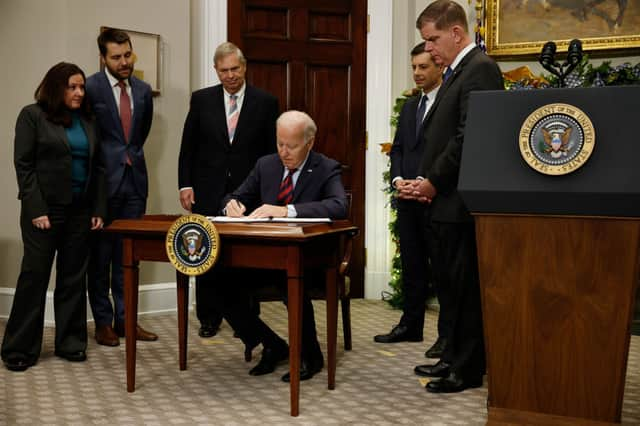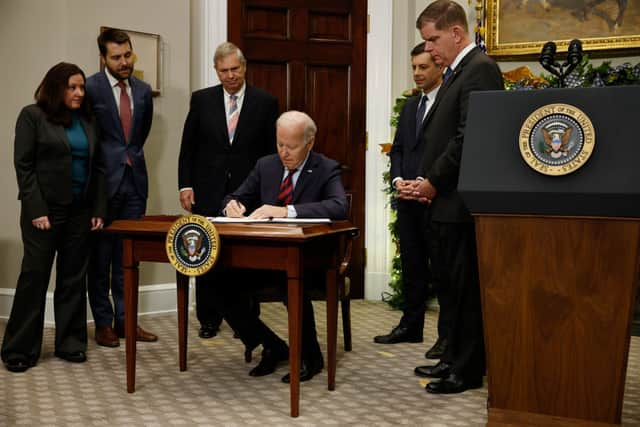US railway strikes: has Joe Biden signed new law to stop railroad train strike - why are they striking?


President Joe Biden has signed legislation to prevent a national railroad strike in the United States, which may have crippled the American economy.
"It was tough for me but it was the right thing to do at the moment - save jobs, to protect millions of working families from harm and disruption and to keep supply chains stable around the holidays," Biden said, adding that the agreement signed on Friday (2 December) prevented "an economic catastrophe."
Advertisement
Hide AdAdvertisement
Hide AdSuch a rail strike might have halted about 30% of cargo shipments in the United States, fueled already-rising inflation, cost the American economy up to $2 billion per day, and stranded millions of rail passengers. Here is everything you need to know about it.
Why did railroad workers want to strike?
On Thursday (1 December), the US Senate voted 80 to 15 to impose a tentative contract agreement struck in September on a dozen unions representing 115,000 workers who could have gone on strike on 9 December.


US railroad companies have lowered labour and other costs in recent years to boost profits, and have been staunchly opposed to extending paid sick time for workers, which would necessitate them having to hire additional staff.
Several labour leaders have chastised Biden, a self-described friend of labour, for pushing Congress to impose a contract that four unions have rejected due to a lack of paid sick leave. “That fight isn’t over,” said Biden on the campaign for more sick leave.
Advertisement
Hide AdAdvertisement
Hide AdThe tentative agreement includes no paid short-term sick days - unions had requested 15 - as railways agreed to just one ‘personal day’.
"Rail carriers make record profits. Rail workers get zero paid sick days. Is this OK? Paid sick leave is a basic human right. This system is failing," Sean O’Brien, the president of the Teamsters union, wrote on Twitter.
Congress used its broad powers to halt transportation strikes, an authority which it does not have in other labour disputes.
American Association of Railroads CEO Ian Jefferies said "none of the parties achieved everything they advocated for" but added, "without a doubt, there is more to be done to further address our employees’ work-life balance concerns."
What would a rail strike have meant for America?
Advertisement
Hide AdAdvertisement
Hide AdA rail strike may have halted around 30% of cargo shipments in the United States, spurred already-rising inflation, cost the American economy up to $2 billion per day, and stranded millions of rail passengers.
Without the new law, train employees may have gone on strike on Friday (9 December), but the consequences could have been felt much earlier, as railways stopped accepting hazardous materials shipments and commuter railroads began suspending passenger services.
Comment Guidelines
National World encourages reader discussion on our stories. User feedback, insights and back-and-forth exchanges add a rich layer of context to reporting. Please review our Community Guidelines before commenting.
